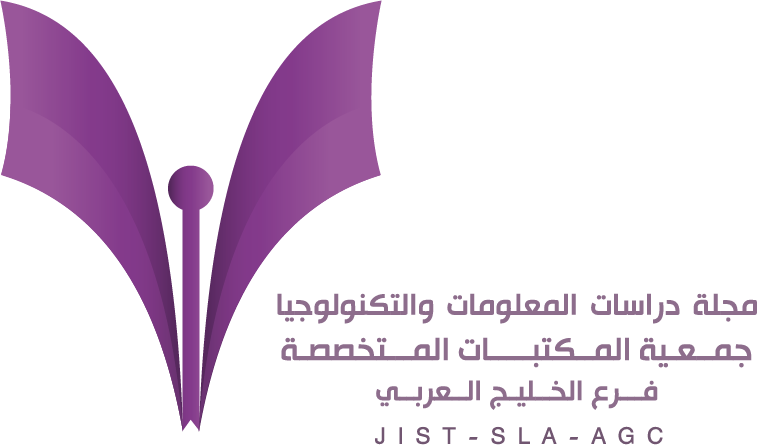- Home
- A-Z Publications
- Journal of Information Studies & Technology (JIS&T)
- Previous Issues
- Volume 2023, Issue 2
Journal of Information Studies & Technology (JIS&T) - Volume 2023, Issue 2
Volume 2023, Issue 2
- Editorial
-
-
الذكاء الاصطناعي وإدارة المعلومات
More Lessإذا كانت إدارة المعلومات هي التعامل مع المعلومات في المنظمات عبر التقاط المعلومات وتخزينها واسترجاعها واستخدامها وحتى التخلص منها بشكل مناسب وجيد، فان التقنيات عبر الزمن كانت هي المحرك والمطور والمغير الأساسي للممارسات والمعايير والأدوات في مجال إدارة المحتوى مما انعكس على الأعمال والممارسات الداخلية والخارجية في مؤسسات المعلومات ومؤسسات الأعمال التي تدار فيها المعلومات. وان كنا قد تحدثنا عن التقنيات الناشئة وتأثيرها كثيرا، فعالم اليوم لا حديث له الا Read More - Top
-
- Research Article
-
-
Digital librarianship skills: post-pandemic strategies for academic librarians in a sub-saharan African country
More LessAuthors: Esther White, Michael Ahenkorah-Marfo and Edward Mensah BorteyeThis article investigated suitable approaches and modalities through which academic librarians could be trained to be skillful for post-pandemic digital librarianship in developing countries, which is woefully inadequate in the available literature. A qualitative research design that considers the natural contexts in which individuals or groups function to provide an in-depth understanding of real-world probl Read More -
مشاريع دعم وتطوير المستودعات الرقمية الأكاديمية: نحو اتحاد أكاديمي لمستودعات الوصول الحر بالجزائر
More LessBy أحسن بابوريالملخص إن مشروعات إنشاء المستودعات الرقمية المؤسساتية في العالم العربي عامة، والجزائر خاصة، تخضع في أغلب الأحوال إلى الاجتهادات الشخصية أكثر مما تخضع للرؤى العلمية المبنية على التخطيط المنهجي الذي يوضح المسار الذي يجب أن يلتزم به المشروع في مواصفاته ومراحل تنفيذه ومتطلبات كل مرحلة، فهناك اعتبارات عديدة. مالية، وبشرية، وقانونية، وإدارية، وتقنية- ينبغي أن تؤخذ في الحسبان في أي مشروع يهدف إلى تأسيس مستودع رقمي مؤسساتي. ومع تزايد الاهتمام بالمستودعا Read More -
Evaluating universities Twitter web pages responding to the Black Lives Matter movement
More LessAuthors: Hind Albadi and Thomas KennyIn the wake of the Black Lives Matter (BLM) movement in May 2020, many colleges and universities responded by making statements on their website and social media channels condemning racism. Higher education institutions began initiatives for diversity, equity, and inclusion (DEI) for faculty, staff, administrators, and students on campus. Three years later, this study investigates whether universities are still off Read More -
عجوة أو مجدول: مجموعة بيانات متوازنة الصنفين لتدريس تعلم الآلة
More Lessالملخص تعد المملكة العربية السعودية أحد أكبر منتجي التمور في العالم، وهي الدولة الأولى عالميّاً في مؤشر الإستراتيجية الحكومية للذكاء الاصطناعي، كما يعد تعلم الآلة واحداً من أكثر موضوعات الذكاء الاصطناعي انتشاراً وأهمية هذه الأيام، وهو أحد التقنيات الناشئة التي يُتوقع لها مستقبل باهر، خاصة في الثورة الصناعية الرابعة المرتكزة على الذكاء الاصطناعي وتطبيقاته التي تخدم البشرية في مجالات عديدة. ويوجد اهتمام حكومي في السعودية بتدريس الذكاء الاصطناعي وتعلم الآلة واستخدامهما لإنتاج جيل يب Read More -
Assessing the digital information literacy of patients during COVID-19 pandemic: Al-Razi Hospital, Kuwait
More LessAuthors: Manal Thamer Idrees and Bibi AlajmiPeople have displayed an overuse of online platforms such as social media to seek information about COVID–19, in which there are misleading information and enormous infodemics on the Internet. This study aims to investigate hospital patients' digital health information literacy during the COVID–19 pandemic. The study followed a quantitative approach. A paper-based questionnaire was distributed to a sample of p Read More -
اتجاهات مديري المكتبات نحو استخدام تطبيقات الذكاء الاصّطناعيّ – الجامعات الأردنية
More LessAuthors: بيان فراس محمد النعانعة and نشروان ناصر طهالملخص هدفت هذه الدّراسة إلى التعرف على اتجاهات مديري المكتبات الجامعية الأردنية نحو استخدام تطبيقات الذكاء الاصّطناعيّ. وجرى استخدام المنهج الوصفي النوعي لتحقيق هدف الدّراسة، وتكوّن مجتمع الدّراسة من جميع مديري المكتبات الجامعية الأردنية، في كلٍّ من المكتبات الجامعية الأردنية (الحكومية والخاصة)، والبالغ عددهم (29) مدير ومديرة مكتبة جامعية، حيث تم اختيارهم بالطريقة القصدية. استجاب منهم (15) مديراً ومديرة، وكانت نسبة الاستجابة (52%) من إجمالي مجتمع الدراسة. ولتحقي Read More
-
Volumes & issues
Most Read This Month
Article
content/journals/jist
Journal
10
5
true
en


